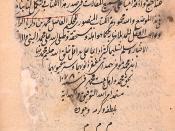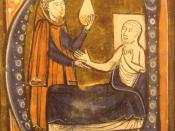The well-known writer George Sarton says in his Introduction to the History of Science that "Rhazes was the greatest physician of Islam and the Medieval Ages." And the Encyclopedia of Islam remarks that "Rhazes remained up to the 17th century the indisputable authority of medicine." The Bulletin of the World Health Organization (WHO), May 1970, pays tribute to him by stating: "His writings on smallpox and measles show originality and accuracy, and his essay on infectious diseases was the first scientific treatise on the subject."
Abu Bakr Muhammad Ibn Zakariya Al-Razi was born at the Persian city of Ray near modern Tehran, Iran in c. 864 AD. It is said that early in his life Al-Razi was interested in singing and music besides other professions. Because of his eagerness for knowledge, he became more interested in the study of alchemy and chemistry, philosophy, logic, mathematics and physics. But it was the field of medicine that he spent most of his life, practicing it, studying and writing about it.
Due to his fame in medicine he was appointed head of the physicians of the Ray Hospital, and later put in charge of the Baghdad main Hospital during the reign of the Adhud-Daulah.
Al-Razi was an iconoclastic cosmologist, who denied that any man had privileged access to intelligence, whether by nature or from nature. Al-Razi, who, though a theist, rejects prophecy on the ground that reason is sufficient to distinguish between good and evil and also that reason alone can enable us to know Allah. He also denies the miraculousness of the Koran and preferred scientific books to all sacred books.
Al-Razi is considered to have been the greatest physician of the Islamic world. With reference to his Greek predecessors, Al-Razi viewed himself as the Islamic version of Socrates in Philosophy, and...



Al razy
its good title its the best in this time
1 out of 1 people found this comment useful.